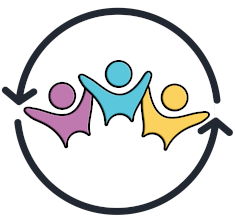In today’s fast-paced, connection-driven world, it can be easy to overlook one of the most important relationships we have—the one with ourselves. Loving yourself isn’t just a trendy buzzword; it’s the foundation of a fulfilled life, especially for individuals with autism and other intellectual disabilities. At Capability Connections, we understand that building social skills and connections starts with a positive self-image. For those who face unique challenges in social settings, learning to love and accept oneself is the first step toward unlocking confidence and forming meaningful relationships.
Social skills require not only external abilities like reading cues and engaging in conversations but also internal qualities such as confidence, emotional stability, and resilience. Before young adults can thrive in social situations, they need to believe in their inherent worth. For individuals with autism or other disabilities, this can often be challenging due to external pressures, perceived differences, or past negative experiences. However, embracing self-love creates a sense of security and self-assurance that fosters healthier relationships with others.
1. Fostering Confidence in Social Interactions
When individuals have a deep sense of self-love, they approach social interactions with a greater sense of security. They are less likely to worry about judgment from others or fear rejection. Self-love encourages confidence, which is essential in social settings, whether it’s starting a conversation or maintaining friendships. For participants in Capability Connections’ programs, building this internal foundation is as important as learning practical communication skills.
Rather than seeing social skills as something to “fix,” our program emphasizes that the process starts from within. Every young adult in our community has something unique and valuable to offer, and by nurturing self-love, they can present their authentic selves in any social situation with pride.
2. Self-Acceptance Creates Resilience
Social situations often come with challenges, whether it’s misunderstanding social cues or dealing with unfamiliar environments. Self-love helps build emotional resilience, which is critical when facing these obstacles. For young adults who may have experienced social struggles in the past, the ability to forgive themselves for mistakes and keep moving forward becomes much easier when they approach the world from a place of self-acceptance.
Our program highlights that making mistakes in social interactions is normal. In fact, every “misstep” is an opportunity for growth. When individuals love themselves, they are more likely to bounce back from perceived failures, using those experiences as stepping stones to better communication.
The Connection Between Self-Love and Emotional Well-Being
Self-love doesn’t just enhance social skills—it’s crucial for overall emotional well-being. When individuals treat themselves with kindness, compassion, and patience, they naturally feel less anxious and more prepared to face daily life. This is particularly important for young adults with autism and other disabilities, who may experience heightened anxiety in social situations.
At Capability Connections, we emphasize that mental health is an integral part of social success. Loving yourself helps reduce self-doubt and anxiety, creating a healthier mindset from which positive social interactions can spring.
1. Reducing Negative Self-Talk
One of the biggest hurdles to self-love is negative self-talk. Many individuals, especially those who have faced social challenges, may fall into the habit of criticizing themselves for every perceived shortcoming. This can lead to a cycle of low self-esteem, making social interactions even more daunting.
Encouraging self-love means recognizing and halting these critical inner voices. Instead of focusing on what went wrong in a social setting, self-love encourages individuals to reflect on what went well and how they can improve next time—without harsh judgment.
2. Promoting Emotional Stability
Self-love promotes emotional stability by giving individuals the tools they need to manage their feelings. This stability is particularly important in social interactions, where emotional intelligence plays a key role. For example, knowing how to regulate emotions can help young adults avoid feeling overwhelmed in social settings. It can also help them respond calmly and thoughtfully to challenging conversations.
By loving themselves, individuals learn to approach emotions with balance. Rather than letting negative emotions take control, they can experience feelings like frustration or disappointment, process them, and move forward in a constructive way.
Practical Steps for Cultivating Self-Love
Self-love doesn’t happen overnight. It’s a journey that involves daily effort and self-compassion. Here are a few practical strategies that can help young adults—and their caregivers—start fostering a deeper sense of self-love.
1. Start with Self-Compassion
The first step toward loving yourself is treating yourself with kindness. Self-compassion involves being gentle with yourself, especially in moments of failure or disappointment. At Capability Connections, we encourage participants to view every experience—whether successful or challenging—as an opportunity for growth. Mistakes aren’t something to fear; they are part of the process of learning.
2. Celebrate Small Wins
It’s easy to overlook small victories when focusing on long-term goals but celebrating every small step in social growth is crucial. Whether it’s maintaining eye contact during a conversation or successfully navigating a group activity, every milestone is worth celebrating. This helps reinforce the idea that progress is continuous, and even small steps contribute to overall social success.
At Capability Connections, we often integrate positive reinforcement into our social skills programs. Each small win is acknowledged and celebrated, allowing participants to feel proud of their progress and motivated to continue.
3. Create Positive Routines
Establishing routines that promote self-care is another way to nurture self-love. This could include daily affirmations, mindfulness exercises, or taking time to engage in activities that bring joy and relaxation. Self-care routines help individuals center themselves emotionally and mentally, making them better equipped to face social situations.
For those who may struggle with self-doubt or anxiety in social interactions, self-care routines offer a grounding mechanism. Knowing that you’ve taken care of yourself before entering a social situation can instill a sense of calm and readiness.
The Role of Caregivers in Encouraging Self-Love
Caregivers play a critical role in fostering self-love in young adults with autism and other disabilities. By modeling self-compassion and celebrating small successes, caregivers can create a supportive environment that nurtures confidence. It’s important for caregivers to remind their loved ones that progress isn’t about perfection—it’s about effort, growth, and self-acceptance.
At Capability Connections, we provide resources for caregivers to support this journey. From offering encouragement during practice sessions to helping their loved ones reflect on their progress, caregivers are integral to the process of building self-love.
Self-Love as the Foundation for Social Confidence
At the heart of every social interaction is the ability to believe in oneself. Loving yourself creates a strong foundation for social success by fostering confidence, resilience, and emotional stability. At Capability Connections, we understand that before young adults can truly connect with others, they need to connect with themselves. Through self-love, individuals gain the tools they need to navigate social situations, build relationships, and thrive.
In the journey toward social growth, every small step is worth celebrating. Whether it’s through mastering social cues or simply learning to be kind to themselves, self-love empowers young adults to face the world with confidence and build meaningful connections.



